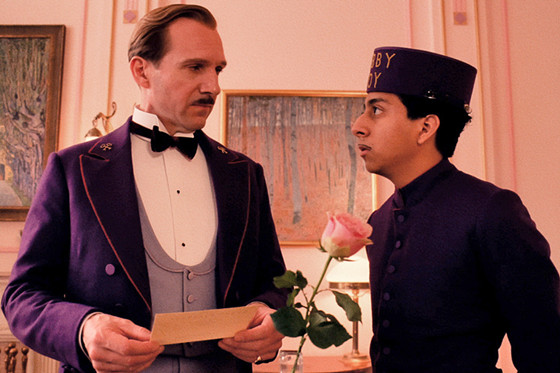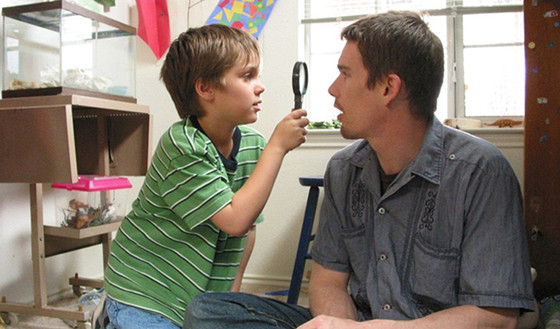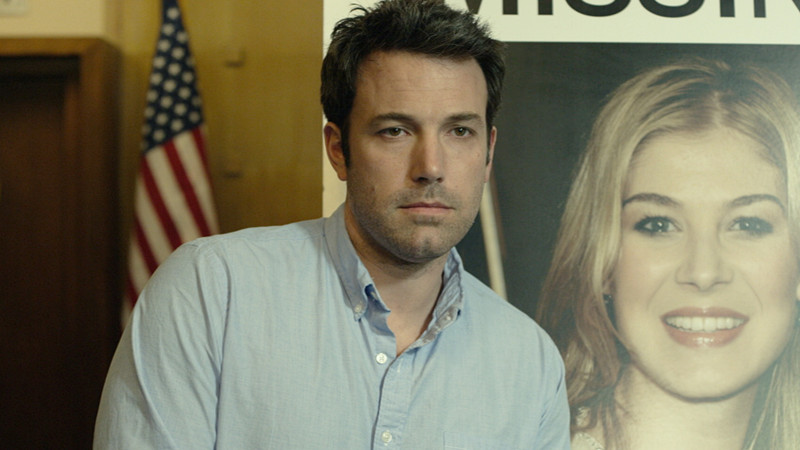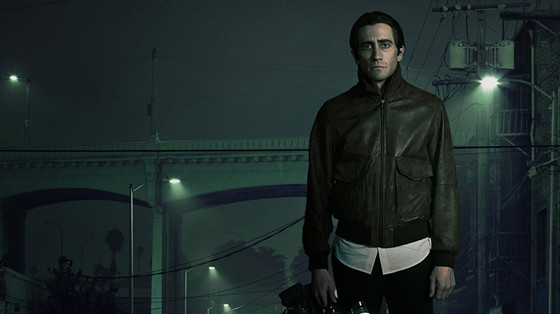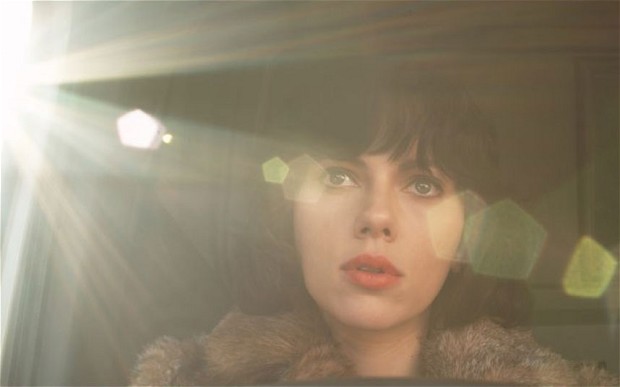7. The Grand Budapest Hotel – Wes Anderson
A story within a story, Budapest starts off by showing us a young girl reading a book about a man relaying another man’s story about his mentor, the owner of The Grand Budapest Hotel. Thankfully, that’s as complex as the film gets, as the story itself becomes streamlined after that. Ray Fiennes plays Monseuir Gustave H., the hotel’s concierge, who provides excellent lodging service to his clients, and even better sexual service to the elderly occupants.
One such elderly woman, after perishing in 1932, bequests Gustave with a valuable painting of hers entitled Boy With Apple. This enrages her family, and thus begins a battle between her relatives and Gustave, who obtains the loyal aid of one of his workers, Zero, in exchange for making him the heir to the hotel.
Filled with Anderson’s usual quirks, Budapest surprises with a comedic timing that would make the Three Stooges blush. From Adrian Brody calling everyone around him a faggot, to Jeff Goldblum calmly asking Willem Dafoe if he’s thrown his cat out a fifth story window, Anderson manages a hilarity not seen in his past efforts.
While also being one of his funniest pieces, Budapest also manages to be one of his darkest, deceptively hiding behind the time period of its story. It doesn’t take long before you’ll realize that the characters are teetering a little too close to World War II, and this doesn’t bode well for them.
6. Boyhood – Richard Linklater
An ambitious experiment of a film, Boyhood is like nothing yet created. Having been shot over the course of twelve years (May 2002-October 2013), Boyhood gives its audience the chance to unleash their inner voyeur, to watch its protagonist Mason, and in turn his actor, Ellar Coltran, grow from toddler to young adult. That being said, with a few minor modifications, Boyhood could have been easily labeled Adulthood, as it just as equally focuses on Mason’s parents and the trials and joys of parenting.
The film’s greatness lies in its purposeful ignorance of story structure. Much like in real life, events happen to the characters, and there is no overarching significance. Mason’s childhood best friend doesn’t get to say goodbye, the first girl he kisses isn’t his only love, his abusive stepdad is out of the picture the minute his mom leaves him, chapters are closed to never be reopened, and other chapters just fade into the backdrop. Include into this that the film hits all the key awkward phases of puberty, and Boyhood adds up to a very cinematic take on real life.
While the film has received unanimous praise, it has also received staunch criticism. Although the film does not offer much in the way of traditional character arcs and structure, it more than makes up for in the new territory its treading. Even those who dislike the experiment itself can at least appreciate the fact that in a sea of Hollywood fluff and compromise, Boyhood stands as something fresh, if not just for its ambition.
5. Gone Girl – David Fincher
It doesn’t matter what’s real, only what you can make people feel and believe. Fincher’s most recent film, Gone Girl, is based on Gillian Flynn’s novel of the same name (the screenplay is also written by her). It tells the story of Nick, a young writer whose wife, Amy, has gone missing. As the investigation continues, all clues point to Nick as being the cause for her disappearance.
As provocative as it is controversial, Gone Girl seems to have struck a chord, with some lambasting the film as misogynist, while others claim it’s the most feminist film of the year. The fact that it can appeal to both sides is a testament to Gillian Flynn’s story, and Fincher’s nonjudgmental adaptation. Part of this appeal is due to both Flynn and Fincher’s ability to switch between Nick and Amy’s perspectives so eloquently.
There are aspects of Nick and Amy that appeal to both masculinity and femininity. It delves into the different types of power that men hold over women and that women hold over men, and that our preconceived ideas about who’s in power aren’t always what they seem.
As with most films, these plot elements are embellished to show an essential part of life – the deception involved in our relationships with each other and the media. We currently live in the age of mass misinformation, where a suburban teeny bopper could be having their writing published and shared with the world, should it go viral.
It doesn’t matter if the information is true, so long as it sparks an emotional response to get clicks and views. Because it sparks an emotional response, this information is then often shared without context or truth supporting it. This is the essence of Amy’s deception. She knows this, and uses her charm to appear the victim and appeal to people’s emotional response.
4. Whiplash – Damien Chazelle
Beautiful in its simplicity, Whiplash tells the story of young aspiring jazz drummer Andrew Neiman, who has nothing but tunnel vision towards his goal of success at his music conservatory. He gains entry into famed Terrance Fletcher’s music ensemble, and finds that Fletcher’s methods of teaching are manipulative and emotionally abusive.
Whiplash achieves a greater depth by extending its philosophy beyond jazz. There is a conversation near the end of the film where Neiman and Fletcher discuss his teaching methods, and how his abusive behavior could discourage the next great musicians from ever becoming great. Fletcher retorts that his methods weed out those who don’t have the gall to become great in the first place.
This theme of success and failure permeate the film, and as anyone who went to some form of art school knows, permeates our lives.
Andrew’s father is a failed writer, his cousins are successful college athletes, and his extended family members criticize him for having his head in the clouds. This added onto Fletcher’s abuse wears away at Neiman, and yet, he continues to improve his drumming due to consistent, rigorous practice. The question then has to be asked: would Neiman be as successful and talented as he becomes without the abuse?
3. Nightcrawler – Dan Gilroy
One of the most stellar directorial debuts in years, Dan Gilroy’s Nightcrawler is as entrancing as it is enjoyable. Sprinkled amongst the dark streets of Los Angeles, Nightcrawler tells the story of Lou Bloom, a thief who finds his passion for shooting footage of accidents and crimes and selling it to news channels.
The film achieves a certain meta quality with the audience of any film enjoying the voyeurism of cinema at the same time that they watch Bloom revel in the voyeurism of his shoots. Gyllenhaal is chilling as he gives one of the most accurate portrayals of a sociopath since Christian Bale’s American Psycho.
Ironically enough, as Bloom films footage of victims, he, himself, preys upon friends and co-workers when they are at their weakest and most frail. He is the modern cyber socialite put on screen. The horrors he witnesses and films do nothing to affect his conscience, because he has none. Instead, he utilizes this lack of empathy to achieve the one thing we all want to achieve, and more importantly in the modern world, what we all want to portray: success.
2. Under the Skin – Jonathan Glazer
Taking creative liberties with Michel Faber’s 2000 novel of the same name, Jonathan Glazer’s film is hauntingly stylish, gorgeous, and completely unforgettable. It features a notable score that is certain to peck at your nerves. The film comes completely from an alien’s perspective of the bizarre, and mundane human existence as she harvests them for their insides.
Despite polarized critical reactions, and although the film will understandably alienate mainstream audiences, it will be remembered as a modern day masterpiece in the future. The visuals of Under the Skin, alone, will stick in your mind months after you’ve seen the final frame of one of the most stylish films of the past year.
1. Birdman – Alejandro Gonzalez Inarritu
Birdman reigns supreme this year. It is a film that utilizes every aspect of its cast and crew to the full potential to create a story that is frighteningly relevant to the industry it’s a part of. Michael Keeton stars as Riggan, a washed up actor famous for portraying an iconic superhero (method acting for Keeton) who struggles to put on a Broadway play. The film follows the days leading up to the play as Riggan battles his ego, his cast, his family, and eventually, himself.
Birdman achieves a hearty depth as it delves into the definition of success in the modern age of social media and superhero destruction porn. It doesn’t take but a quick look at the latest Youtube partner channel to see that there is a difference between being famous and being talented, and Birdman explores the concept of sellout in full.
Birdman also manages to be genuinely hilarious. Its supporting ensemble cast, featuring the likes of Edward Norton, Naomi Watts, and Emma Stone, all star as individuals each broken in their own right. Anyone who has worked in a form of theater will appreciate the haphazard drama of the backstage antics.
And on top of it all, the film has a technical superiority, featuring a striking look and style, as the crew managed to make the film feel like it was made in one long take. While other films have made similar attempts (Enter the Void, Silent House) Birdman is the first that feels like a fully realized success of this approach.
Author Bio: Ethan Levinskas is a writer living in North Hollywood where he enjoys a consistent diet of oven baked pizzas and blessing each slice with his shameless tears. He earned his Bachelor of Arts in Cinema Art + Science (yes, that is the degree name) at Columbia College Chicago with a focus in screenwriting. His goal is to one day have people enjoy his stories from a reclined leather seat with a bag of overpriced popcorn in their hands.
